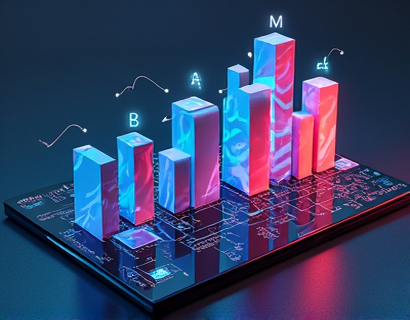Smart Contracts and Management Tools: Revolutionizing Governance for Enhanced Democracy and Participation
In recent years, the intersection of technology and governance has given rise to innovative solutions aimed at transforming traditional democratic processes. Among these, smart contracts and advanced management tools stand out as pivotal elements in creating a more inclusive, transparent, and efficient system of governance. This article explores the transformative potential of these technologies, focusing on how they can streamline decision-making, enhance transparency, and boost community engagement, ultimately fostering a more participatory and universal democracy.
The Role of Smart Contracts in Governance
Smart contracts are self-executing contracts with the terms of the agreement directly written into code. They run on blockchain technology, a decentralized and immutable ledger that ensures transparency and security. In the context of governance, smart contracts can automate and enforce the execution of agreements and policies, reducing the need for intermediaries and minimizing the potential for human error or manipulation.
One of the primary benefits of smart contracts in governance is their ability to streamline decision-making processes. By codifying rules and conditions, smart contracts can automatically trigger actions when predefined criteria are met. For example, in the allocation of public funds, smart contracts can ensure that funds are released only when specific milestones are achieved, as verified by independent parties. This not only speeds up the process but also increases accountability and trust in the system.
Enhancing Transparency through Blockchain
Transparency is a cornerstone of democratic governance, and blockchain technology provides a robust solution to enhance it. The immutable nature of blockchain ensures that once a transaction or contract is recorded, it cannot be altered or deleted. This transparency extends to all stages of governance, from budget allocation to policy implementation.
Citizens can access real-time data on government operations, from financial transactions to the progress of public projects. This level of transparency helps to build trust between the government and the governed, reducing corruption and increasing public confidence in institutional processes. Moreover, smart contracts can be designed to provide detailed logs of all actions taken, further enhancing accountability.
Boosting Community Engagement
Engagement is crucial for a healthy democracy, and smart contracts and management tools can significantly enhance community participation. By leveraging blockchain, governments can create platforms that allow citizens to propose, vote on, and monitor the implementation of policies and projects directly. This direct democracy approach empowers individuals and ensures that their voices are heard and acted upon.
For instance, a smart contract-based platform can facilitate participatory budgeting, where citizens vote on how a portion of the public budget is spent. The process is transparent, with all proposals, votes, and outcomes recorded on the blockchain. This not only increases participation but also ensures that the decisions reflect the true will of the community.
Innovative Management Tools for Effective Governance
Beyond smart contracts, innovative management tools are essential for effective governance. These tools can range from digital platforms for public consultation to advanced analytics for data-driven decision-making. The integration of these tools with blockchain technology creates a comprehensive ecosystem that supports transparent, efficient, and participatory governance.
One such tool is a digital platform for public consultations, where citizens can provide feedback on proposed policies and projects. These platforms can use smart contracts to ensure that all submissions are recorded and considered in a transparent manner. Additionally, the use of blockchain can prevent tampering and ensure that the feedback process is fair and inclusive.
Another important tool is data analytics, which can be used to analyze large datasets to inform policy decisions. By leveraging blockchain, the integrity of the data is maintained, ensuring that decisions are based on accurate and unaltered information. This data can be used to identify trends, predict outcomes, and optimize resource allocation, leading to more effective governance.
Case Studies and Real-World Applications
Several initiatives around the world are already leveraging smart contracts and management tools to revolutionize governance. One notable example is the city of Zug in Switzerland, which has become a hub for blockchain innovation. The city has implemented a smart contract-based system for various municipal services, including property registration and tax payments. This has not only streamlined processes but also increased transparency and citizen engagement.
Another example is the use of blockchain in voting systems. Estonia, a leader in digital governance, has implemented an e-voting system that uses blockchain to ensure the security and integrity of elections. This system allows citizens to vote online, increasing participation and reducing the risk of fraud.
Challenges and Considerations
While the potential of smart contracts and management tools in governance is significant, there are several challenges and considerations that must be addressed. One of the primary concerns is the technical complexity and the need for a skilled workforce to develop and maintain these systems. Governments and organizations must invest in training and education to build the necessary expertise.
Another challenge is ensuring accessibility. Not all citizens may have the technical knowledge or access to the required devices to participate in blockchain-based governance systems. To address this, it is crucial to design user-friendly interfaces and provide support to ensure inclusive participation.
Privacy is also a critical issue. While transparency is essential, it must be balanced with the need to protect sensitive information. Smart contracts and management tools should be designed with robust privacy features to safeguard personal data.
The Future of Governance
The integration of smart contracts and management tools represents a significant step towards a more democratic and participatory governance model. By automating processes, enhancing transparency, and boosting community engagement, these technologies have the potential to create a more inclusive and effective system of governance.
As more governments and organizations adopt these innovations, we can expect to see a shift towards universal democracy, where every citizen has a meaningful role in shaping their society. The journey ahead will require collaboration, innovation, and a commitment to addressing the challenges that arise. However, the benefits of a more transparent, efficient, and participatory governance system make this endeavor well worth the effort.











































